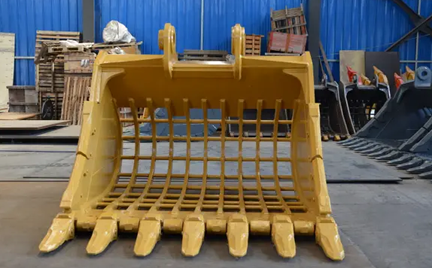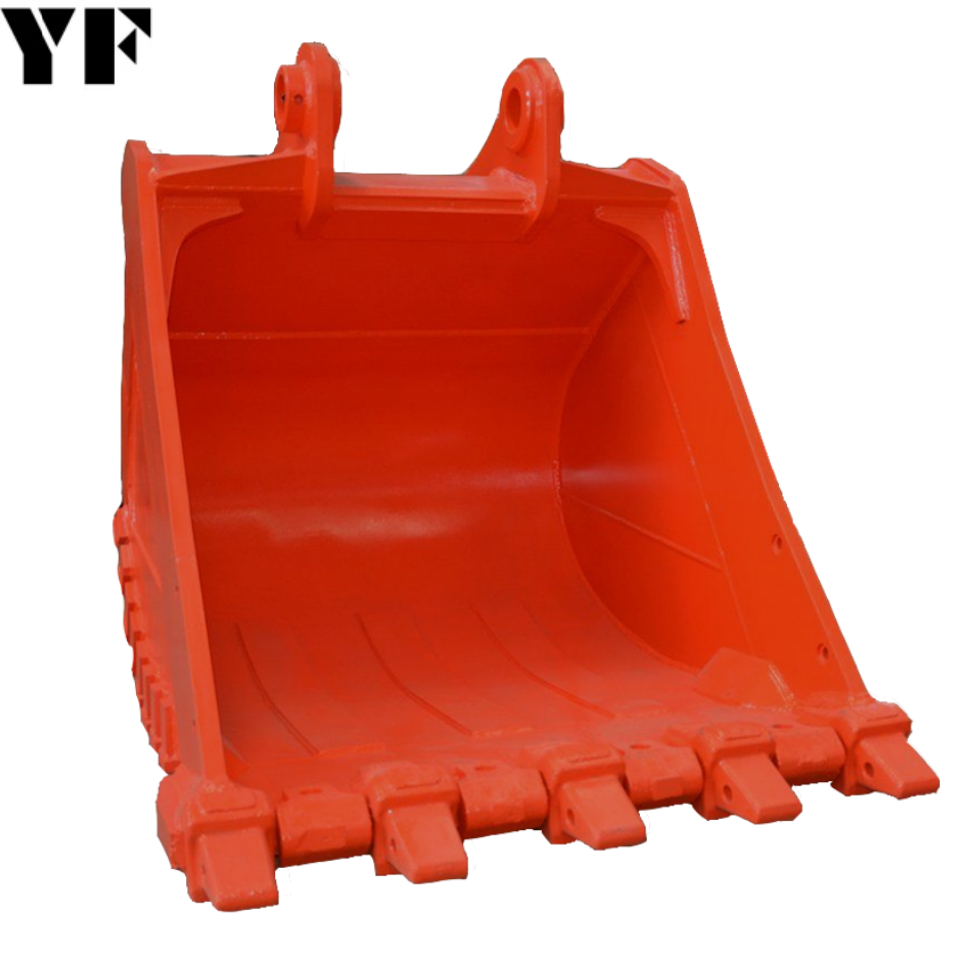Ditching and slope grading are critical tasks in construction, agriculture, and land management projects. Whether it’s creating proper drainage channels, shaping embankments, or preparing land for planting, the precision and quality of earthmoving work directly affect project success and long-term stability.
Unlike rough digging, ditching and grading require careful control over depth, angle, and surface smoothness to ensure water flows correctly and soil erosion is minimized. Even small errors in slope or ditch shape can lead to drainage problems, flooding, or costly repairs down the line.
To achieve this level of accuracy, operators rely on specialized excavator attachments such as tilt buckets and clean-up buckets. These buckets provide enhanced maneuverability and control, allowing precise shaping of land contours, smooth finishes, and efficient removal of debris.
Understanding the capabilities and best uses of tilt and clean-up buckets can help contractors and equipment operators improve efficiency, reduce rework, and deliver high-quality ditching and slope work on any job site.
What Is a Tilt Bucket? How It Works and Key Features
A tilt bucket is a versatile excavator attachment designed to provide enhanced control and flexibility during grading, ditching, and shaping tasks. Unlike a standard bucket, a tilt bucket can rotate or tilt left and right, usually up to 45 degrees or more, allowing operators to adjust the bucket angle hydraulically while working.
How It Works
The tilt bucket connects to the excavator’s arm through a hydraulic mechanism that enables the bucket to pivot independently of the boom and stick. This tilting motion allows the operator to easily shape slopes, contour trenches, or grade uneven terrain without repositioning the entire machine. It provides greater precision, especially on angled surfaces or tight spaces.
Key Features
Hydraulic Tilt Mechanism: Enables smooth and adjustable bucket rotation for precise angle control.
Improved Maneuverability: Allows the operator to work on slopes, banks, and ditches with better accuracy.
Enhanced Versatility: Suitable for various applications including ditch cleaning, slope shaping, trench grading, and fine contouring.
Durability: Built with reinforced steel and wear-resistant components to handle tough earthmoving conditions.
Compatibility: Available in different sizes to fit a wide range of excavator models and work requirements.
By using a tilt bucket, operators can achieve smoother finishes and faster cycle times, reducing the need for manual grading and improving overall job site productivity.
What Is a Clean-Up Bucket? When and Why to Use It
A clean-up bucket, also known as a grading bucket, is a specialized excavator attachment designed primarily for finishing work. Unlike digging buckets equipped with teeth, clean-up buckets feature a wide, smooth cutting edge without teeth, allowing for precise shaping, smoothing, and leveling of soil and other materials.
When to Use a Clean-Up Bucket
Clean-up buckets are ideal for tasks that require a smooth surface finish rather than aggressive digging. Common applications include:
Ditch Cleaning: Removing loose debris and sediment from drainage ditches without disturbing the underlying structure.
Slope Grading: Shaping embankments and slopes to the desired angle and smoothness for erosion control and landscaping.
Site Preparation: Final leveling of construction sites before paving or landscaping.
Fine Grading: Creating clean contours around foundations, roads, and landscaping features.
Why Use a Clean-Up Bucket
Smooth Finish: The absence of teeth prevents gouging or uneven surfaces, resulting in a clean, polished finish.
Material Retention: The bucket’s design allows for efficient collection and transport of loose materials such as soil, sand, and small debris.
Reduced Soil Disturbance: It minimizes damage to sensitive areas, making it suitable for environmentally sensitive projects.
Improved Control: Operators can precisely control the depth and angle of cut for detailed grading work.
Using a clean-up bucket ensures that ditching and grading tasks are completed with high accuracy and professionalism, reducing the need for manual rework and improving overall project quality.

Advantages of Using Tilt Buckets for Slopes and Angled Terrain
Tilt buckets offer significant benefits when working on slopes, banks, and other angled terrain. Their hydraulic tilt capability allows operators to precisely control the bucket’s angle, resulting in greater efficiency and higher-quality results. Here are some key advantages:
1. Enhanced Precision and Control
The ability to tilt the bucket up to 45 degrees or more allows operators to adjust the cutting edge angle without repositioning the entire excavator. This precise control is essential for creating smooth slopes, accurate ditch profiles, and consistent grading.
2. Increased Versatility
Tilt buckets can perform a variety of tasks, including shaping, ditch cleaning, trench grading, and contouring. Their flexibility reduces the need for additional attachments or equipment, streamlining operations and saving costs.
3. Reduced Machine Movement
Because the bucket angle can be adjusted independently, operators can complete complex grading and shaping without constantly moving or repositioning the excavator. This reduces cycle times and minimizes wear on the machine and tracks.
4. Improved Operator Safety
Working on slopes and uneven terrain is safer when operators can precisely control the bucket’s position. Tilt buckets help avoid overreaching or awkward machine positioning, lowering the risk of accidents.
5. Superior Finish Quality
Tilt buckets provide a cleaner, more even finish on slopes and trenches compared to standard buckets, which often leave uneven or rough surfaces. This reduces the need for manual touch-ups or additional finishing work.
Benefits of Clean-Up Buckets in Ditch Maintenance
Clean-up buckets play a vital role in maintaining ditches by offering a range of advantages that enhance efficiency and quality. Their smooth-edged design and versatile functionality make them indispensable tools for ditch maintenance tasks. Here are some key benefits:
1. Precise Removal of Debris and Sediment
Clean-up buckets allow operators to remove accumulated debris, sediment, and silt from ditches without disturbing the underlying soil structure. This precision helps maintain proper water flow and prevents blockages that can lead to flooding or erosion.
2. Smooth and Even Surfaces
Because clean-up buckets lack teeth, they provide a clean, smooth finish when clearing or reshaping ditches. This reduces uneven surfaces that can cause water pooling or irregular flow patterns.
3. Reduced Soil Disturbance
The design of clean-up buckets minimizes disturbance to ditch banks and surrounding areas, which is crucial for preserving vegetation and preventing erosion. This makes them ideal for environmentally sensitive projects.
4. Improved Efficiency and Productivity
Using clean-up buckets speeds up ditch maintenance by allowing operators to clean and grade simultaneously. This reduces the need for additional manual labor and follow-up work.
5. Versatility in Material Handling
Clean-up buckets can handle a variety of materials, including loose soil, sand, gravel, and small debris. Their broad design also enables effective loading and transport, making maintenance tasks more streamlined.
Case Examples or Use Scenarios
Drainage Ditch Work
Using tilt and clean-up buckets in drainage ditch projects enhances precision and speed. For example, a tilt bucket allows operators to angle the bucket precisely to shape sloped ditch walls, ensuring effective water runoff. Meanwhile, a clean-up bucket can be used afterward to smooth the ditch floor and remove loose debris, preventing clogging and maintaining proper flow.
Roadside Slope Grading
On road construction sites, tilt buckets are invaluable for contouring embankments and roadside slopes. Operators can adjust the bucket angle to create uniform slopes that reduce erosion risk and improve safety. Clean-up buckets help finish the job with a smooth, consistent surface.
Landscaping and Site Preparation
Both bucket types are essential in landscaping projects where detailed earth shaping is required. Tilt buckets help sculpt complex terrain, while clean-up buckets provide final grading, ensuring the land is ready for planting or construction.
Compatibility Tips: Matching with Quick Couplers or Tilt Systems
To maximize efficiency, it’s important to ensure your tilt or clean-up bucket is compatible with your excavator’s quick coupler or tilt system:
Quick Couplers: Verify that the bucket’s mounting pins and dimensions match your machine’s quick coupler specifications to allow fast attachment changes without manual pin removal.
Hydraulic Tilt Systems: For tilt buckets, ensure your excavator is equipped with a hydraulic circuit compatible with the bucket’s tilt mechanism, including necessary control valves and hoses.
Weight and Size: Confirm that the bucket’s weight and size suit your excavator’s lifting capacity and reach to maintain safe and efficient operation.
Proper compatibility reduces downtime, enhances safety, and improves operational flow on the job site.
Choosing the Right Tool for Efficient Earth Shaping
Ditching and slope work require precision, versatility, and durability to achieve the best results. Tilt buckets provide exceptional control for shaping angled terrain and complex contours, while clean-up buckets deliver smooth, professional finishes essential for drainage and landscaping projects.
By understanding the unique advantages of each bucket type and ensuring they are compatible with your excavator’s coupler and hydraulic systems, you can select the ideal tool to meet your specific earth shaping needs. Choosing the right bucket not only improves productivity and reduces operational costs but also ensures long-lasting, high-quality results on every job.
For reliable, durable, and expertly designed tilt and clean-up buckets, consider Xuzhou YF Bucket Machinery Co., Ltd. Their extensive product range and knowledgeable team can help you find the perfect attachment to optimize your project. Visit www.yfbucket.com today to learn more or get in touch for personalized support.









